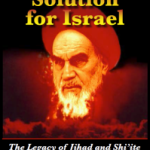By Rachel Ehrenfeld and Alyssa A. Lappen
Washington Times | June 9, 2006
Confronted with criticism over its increasingly restrictive policies, lack of economic freedom and growing corruption, Russian Economics Minister German Gref boasts that direct foreign investment in Russia grew 100 percent in the first quarter of 2006.
But jubilant investors should beware. A recent report from the Council on Foreign Relations on “Russia’s Wrong Direction” warns “that anyone can become vulnerable when the state bureaucracy, either at the president’s direction or merely with his support, decides to seize private assets.” U.S. doubts regarding Russia’s accession to the World Trade Organization reflect those concerns.
To make Russia’s opaque markets more palatable, Russia is now paying millions to the New York-based PR firm Ketchum. Considering Russia’s level of corruption, the PR firm faces a daunting task.
An October 2005 survey by the Russian think-tank Indem found such a large increase in the volume of business-related bribes that their total exceeded twice Russia’s federal budget. Russian corruption is symptomatic of problems, including “a neutered parliament, subservient (and sometimes intimidated) media and a suborned judiciary,” says Indem’s Georgy Satarov. Another Russian economic limitation is the government’s penchant for appropriation of private assets. First Deputy Prime Minister Dmitry Medvedev said on June 2 that Russia should retain control over strategic companies, according to Itar-Tass. Mr. Medvedev, a likely contender for the Russian presidency in 2008, admits the government is “not the most efficient proprietor.” However, he insists that Russia should control companies “vital for the country,” including defense, atomic energy and natural resource giants like Gazprom, whose board he heads.
Companies in other industries, he said, “can and must become private property.” But he adds that the government can “enlarge its role in certain companies for a certain period [whenever] necessary to put the companies in order.” Clearly, “private” in Russia does not really mean private.
Ironically, the Kremlin threatens retaliation against those nations concerned with Russia’s proposed entry into the WTO. Spokesman Dmitry Peskov recently warned, “If you discriminate against us in the WTO, you can’t expect us to welcome you with open arms.”
A former senior U.S. Treasury official on Russian affairs, Mark Medish, says, “• verall the private and state sectors both suffer from endemic corruption.” He adds: “[T]he institutions needed for the rule of law, enforcement of contracts and protection of property rights are still weak in Russia; furthermore, there is concern that the Putin administration has tended to undermine rather than build up these institutions. The trend is worrisome.”
The sagas of VimpelCom and Megafon, Russia’s second and third largest mobile telephone operators, exemplify difficulties arising from Russia’s corruption and lack of transparency.
VimpelCom, with $3.2 billion in gross operating revenues and $2.7 billion in equity capitalization, trades on the New York Stock Exchange. But major internal conflicts prevented VimpelCom’s board from officially approving its 2005 annual report, which is not yet filed at the Securities and Exchange Commission. Indeed, Telenor, Norway’s largest telecommunications company, seeks a “market-based separation agreement” from its adversary, a subsidiary of Russia’s Alfa Group. The hot stock’s unusual volatility on high-volume, above-average price-to-cash flow and price-to-earnings ratios, and decreasing strength in “relative price,” may signal market danger.
Similarly, Bermuda-based IPOC International Growth Fund hopes to retrieve from Alfa Group a Megafon stake now worth $1.7 billion. In August 2003, Alfa purported to buy 25.1 percent of Megafon through several offshore companies for $295 million. Also in 2003, Alfa bought LV Finance, a British Virgin Islands firm with Moscow offices, for $200 million. But in 2001, LV Finance had sold to IPOC options to buy other companies that owned the disputed Megafon stake, which IPOC wants back from Alfa. This, however, is not just another business dispute; the lack of transparency that characterizes Russia’s businesses have led to at least five international arbitrations and several lawsuits and countersuits in six countries, without resolving who has rights to the shares.
Another fraudulent Russian business practice is to force false bankruptcies, to affect hostile takeovers. According to Alexander Radygin, from Moscow’s Institute for the Economy in Transition, Russia’s corrupt legal system supports this practice. For example, companies that buy accounts payable and promissory notes of a targeted business change identity. The “new company” then takes the unpaid bills to bankruptcy court, where it demands and obtains the assets of the targeted business. This is how 23 Moscow department stores were taken over.
Mr. Radygin describes yet another standard Russian method to separate rightful shareholders from their assets, helped by corrupt police. The MDM group hostilely took over Nevinnomysky Azot chemical company. It bought shares, bribed the tax police to have the company’s director general arrested, convened an early shareholder meeting and paid the police to block shareholders from the meeting. Large Russian companies also practice such methods. Mr. Radygin says the Alfa Group used similar tactics to take over Rostov’s Taganrog metallurgical plant. They too, used police services and private security to control the plant.
While such practices are the standard in Russia, the U.S. should limit Russia’s participation in the WTO.
Rachel Ehrenfeld is director of the American Center for Democracy and a member of the Committee on the Present Danger. Alyssa A. Lappen is a senior fellow at the American Center for Democracy.
All Articles, Poems & Commentaries Copyright © 1971-2021 Alyssa A. Lappen
All Rights Reserved.
Printing is allowed for personal use only | Commercial usage (For Profit) is a copyright violation and written permission must be granted first.





